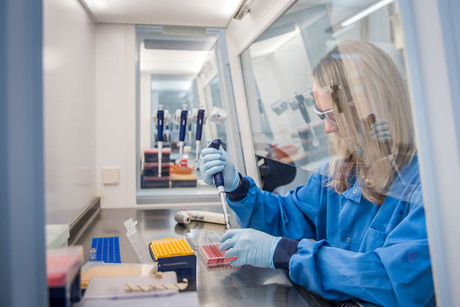Universal flu vaccine under development

Oxford University spin-out company Vaccitech has received £10 million from Oxford Sciences Innovation to take a universal flu vaccine, as well as a number of other vaccines that trigger the immune response needed to prevent or treat a range of serious diseases, through clinical trials.
Currently, no single vaccine can give immunity against even a majority of circulating flu virus strains. Instead, flu vaccines are manufactured in advance of each flu season using complex forecasting, based on data from the preceding year. However, predicting flu strains is difficult; for instance, records from the US Centers for Disease Control show that in 2013–14 the rate of protection dipped as low as 3.4%.
Vaccitech’s most advanced program is a universal vaccine designed to improve the protection provided by the seasonal flu vaccination for people over 65. Development of the vaccine is taking place at the Jenner Institute, a partnership between the University of Oxford and The Pirbright Institute, where Professor Sarah Gilbert says clinical trials are showing great promise.
“To create a vaccine which works against every flu virus, we’ve targeted two proteins inside the virus which do not change, even as the virus mutates the proteins on its surface,” Professor Gilbert explained. “This also means the vaccine should work against all human, avian and swine influenza strains.
“The vaccine has proven safe and shown good clinical responses, including enhanced protection against the flu detectable in older adults even one year after vaccination. It has performed well when given with the standard flu vaccine.”
Professor Gilbert said the institute is currently planning a phase IIb, 1500-patient trial scheduled to begin later in 2016 — the next step towards regulatory approval. Vaccitech is also developing a therapeutic cancer vaccine, initially targeting prostate cancer.
“Vaccitech’s vaccine stimulates the body to mount an immune attack against a unique tumour-specific protein found on the most common types of solid cancer, including prostate, renal, colorectal and lung cancers,” said the Jenner Institute’s Professor Adrian Hill.
A phase I/II study to assess safety and efficacy of this vaccine in men with low- or intermediate-risk prostate cancer is underway.
Archer completes potassium sensing alpha prototype
Quantum technology company Archer Materials Limited has developed an early Biochip prototype...
Farm animals and aquaculture cryopreservation partnership announced
Vitrafy Life Sciences Limited has announced that it has entered a 12-month exclusive agreement...
Babies of stressed mothers likely to get their teeth earlier
Maternal stress during pregnancy can speed up the timing of teeth eruption, which may be an early...



